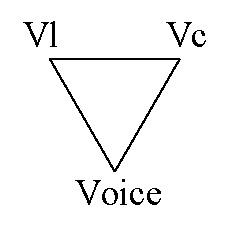FRANKE
FYNBOS
for overtone singer, solo violin, solo cello and string orchestra
Full Score



for overtone singer, solo violin, solo cello and string orchestra
Full Score


for overtone singer, solo violin, solo cello and string orchestra
(2016)
Full score
EIGENTUM DES VERLEGERS · ALLE RECHTE VORBEHALTEN ALL RIGHTS RESERVED
Ein Unternehmen der Edition PEtErs GrouP
LEIPZIG · LONDON · NEW YORK
SIMPLICITY
The pine tree lives for a thousand years, The morning-glory but for a single day; Yet both have fulfilled their destiny. (Japanese)
dedicated to Gareth Lubbe
commissioned by the O/Modernt Kammarorkester and Hugo Ticciati
wp: 29th of November 2016, Stockholm, Gareth Lubbe – overtonsinger, Hugo Ticciati – solo violin, direction, Julian Arp – solo cello, O/Modernt Kammarorkester
Duration: about 10`
© Verlag C. F. Peters Leipzig
Instrumentation:
Overtonsinger
Solo violin
Solo cello
String orchestra (Minim. 5-4-3-3-2)
Beide Solo-Instrumente (Violine und Cello) sollen im letzten Teil ab Ziffer 20 ein Dreieck mit dem Obertonsänger bilden.
Both solo instruments (violin and cello) should at the end (letter 20) form a triangle together with the overtonsinger.
Notation:
Partitur ist in C notiert.
Score in C notated.
Glissandi generell sofort beginnen. / Immediately begin Glissando.
In aleatorischen Abschnitten oder in Kombination mit metrisch festen Abschnitten ist die Notation nicht identisch mit dem Klangergebnis.
In aleatoric sections or in combination with steady-metre sections, here notation is not identical with the sound result.
metrischer freier Abschnitt, hier gelten die Versetztzungszeichen nur für die unmittelbar folgende Note /
Section in free metre; here accidentals apply to next following note only
Atempause / short caesura
sehr hoher Ton / very high pitch
so schnell wie möglich / as fast as possible
kurzer Vorschlag / short grace note
kurze Fermate mit exakter oder ungefährer Sekundenangabe / short fermata with duration given in seconds exactly or approximately
leichter Akzent / light accent
con sordino
senza sordino
senza vibrato
ordinario vibrato
molto vibrato
ord.
p. v. poco vibrato ordinario
Str: Vierteltonerhöhung / raise a quarter tone
Str: Vierteltonerniedrigung / lower a quarter tone
s. B.
c. l. b.
sul tast.
Str: starker Bogendruck/ins Kratzen gehen - „schmutziger“ Klang / heavy bow pressure, going into scraping - „dirty“ sound
Str: Bartók-Pizzicato mit bestimmter Tonhöhe (mit Nachklang) / Bartók-Pizzicato with determinate pitch (with dying away)
Str: Bartók-Pizzicato, erstickt bzw. gedämpft auf der jeweils angegebenen Saite (dumpfer Klang) / Bartók-Pizz., smothered i.e. muted on the respectively cited string by hand on the fingerboard (muffled sound)
Str: sofort abdämpfen / damp immediately
Str: mit der linken Hand Saiten leicht berühren, es soll ein geräuschhafter Klang entstehen, keine Töne / lay down lightly left hand on strings, produce a sound of noises, no real pitches please
Str: offene Saite / open strings
Str: c. l. b. - col legno battuto
Str: sul tast. - sul tastiera
Klatschen / clapping
Mit Fuß aufstampfen / stomp with feet
Some thoughts about FYNBOS:
I started my working period actually with a Japanese poem as my way to get inspired:
SIMPLICITY
The pine tree lives for a thousand years, The morning-glory but for a single day; Yet both have fulfilled their destiny.
The other inspiring image was the South African landscape Fynbos, a tribute to Gareth Lubbe and his home country, which I like so much: https://en.wikipedia.org/wiki/Fynbos
Here I used also a very famous song from South Africa, the click song, the first part of the song:
Text:
Igqirha lendlela nguqongqothwane
The diviner follows the road as a dung beetle
Some more thoughts during my composing: eternity - nature - god - birth - cells - nothing - spring - warmness - growing - body - voicesinging - summer - space - community - autumn – circle
Bernd Franke, September 2016
(Tutti)
(Tutti)
(Tutti)
ca3-4x8Takte/4e,GestusvomClick-Songbeibehalten,vomMeloszumGeräusch,langsamoffstage,laufelangsamvonderBühnezum Publikum,bleibeimoderhinterdemPublikumstehen,langesdimin,wenndasPublikumerreicht,dannsetzendieStreicherein ca3-4x8bars,gesturefromtheclick-songmaintained,frommelodytosound,slowlywalkoffthestagetotheaudience,remainamongorbehind theaudience,longdiminuendoWhentheaudienceisreached,thenentryofthestrings
*EinsatzvonStreichern,wennVoicesichimPublikumbefindet Entranceofstringswhenthevoiceisintheaudience & pppp *pocovibr & pppp pocovibr
pppp pocovibr ? pppp
(mitEinsatzZiffer19vonStrnoch10-15'',dann Einsatzca15-20''nachEinsatzvonSolo-Vl,unabhängigvomTutti) withentryatNumber19singca10-15seconds,thenpause,entry ca15-20secondsafterentryofsoloviolin,independentlyfromTutti
(freierEinsatzca15-20''nachEinsatzvonSolo-Vc,unabhängigvomTutti) freeentryca15-20secondsafterentryofsolocelloindependentlyfromTutti
U
U U (ca15-20''warten,dannfreierEinsatz,unabhängigvomTutti) waitforca15-20seconds,thenfreeentry,independentlyfromTutti
Streicher:Phrase3xspielenpocovibr zart,individuell,nichtsynchron, Playphrase3xpocovibratotenderly individuallynotinsync1xmf2xp3xpp 1xmf,2xp,3xpp
y 2-6'' individuellweiter individually continue
y 2-6'' individuellweiter individually continue
y 2-6'' individuellweiter individually continue
y 2-6'' individuellweiter individually continue
y 2-6'' individuellweiter individually continue
y 2-6'' individuellweiter individually continue
? f y 2-6'' individuellweiter individually continue
individually continue
(Solo-Vl,SoloVc,PositionenrechtsundlinksvomOrchesteraufBühne,solleinDreieckmitVoiceergeben) soloviolin,solocello,positions:eithersideoftheorchestraonstage,resultinginatrianglewiththevoice
(StimmensieheS15/16/17)/parts,seePages14,15,16
(NotationentsprichtnichtKlangergebnis!,nichtsynchron!) notationdoesnotcorrespondtothesoundresultnotsynchronous (Tutti)
y mv 4-6'' f (indivweiter/indivcontinue)
y 4-6'
y 4-6'
y 4-6'
(indivweiter/indivcontinue)
(indivweiter/indivcontinue)

Streicher:Phrase3-4x,1xmf2xmp3xp-pp (4Malppp),pocovibr,nichtsynchron,e 60 Strings:Phrase3-4x1xmf2xmp3xp-ppfinally4xppp pocovibrato,outofsync,quaver60
(StimmensieheS15/16/17) (partsseePages15-17)
(NotationentsprichtnichtKlangergebnis!nichtsynchron!EinsatzzumBeendenderPhrasegibtVoice3oder4xweitermit ) notationdoesnotcorrespondtothesoundresult,outofsync,entrytofinishthephraseisVoice,3or4x,continuewithpause U
(*diminaufZeichenvonVoice)
Solo-Violoncello pppp
(Einsatzca15-20'',abZiffer19) (völligfreiundunabhängigvomTutti,eca60) entryaboutca15-20secondsfromNumber20, completelyfreeandindependentlyoftheTutti,quaverca60
(stacc)
Solo-Violine pppp
(EinsatzvonSolo-Vlca15-20''nachEinsatzvonSolo-Vc, völligfreiundunabhängigvomTutti,eca60) entryofsoloviolinca15-20secondsafterentryofsolocello, completelyfreeandindependentlyoftheTutti,quaverca60
(stacc)
(EinsatzvonVoiceca15-20''nachEinsatzvonSolo-Vl, völligfreiundunabhängigvomTutti,eca60) EntryofVoiceca15-20secondsafterentryofsoloviolin, completelyfreeandindependentlyoftheTuttiquaverca60
(ZeichenfürStrgebenzumBeendenderPhrase,halten ) giveasign/gestureforstringstoendofthephrase

For more than 200 years, Edition Peters has been synonymous with excellence in classical music publishing. Established in 1800 with the keyboard works of J. S. Bach, by 1802 the company had acquired Beethoven’s First Symphony. In the years following, an active publishing policy enabled the company to acquire new works by composers such as Brahms, Grieg and Liszt, continuing into the twentieth century with Richard Strauss, Arnold Schoenberg and John Cage.
Today, as the publisher of living composers from around the world, Edition Peters continues its role as a champion of new music while continuing to develop its historic and education catalogues with award-winning critical and pedagogical editions.
Seit über 200 Jahren steht die Edition Peters für höchste Qualität im Bereich klassischer Notenausgaben. Gegründet im Jahr 1800, begann der Verlag seine Tätigkeit mit der Herausgabe von Bachs Tastenmusik. Schon zwei Jahre später waren die Rechte an Beethovens erster Sinfonie hinzugekommen. In der Folgezeit wuchs der Katalog um neue Werke von Komponisten wie Brahms, Grieg und Liszt. Diese Tradition fand ihre Fortsetzung im 20. Jahrhundert in der Zusammenarbeit mit Richard Strauss, Arnold Schönberg und John Cage.
Als Verleger zahlreicher zeitgenössischer Komponisten aus aller Welt ist die Edition Peters auch weiterhin Anwalt neuer Musik. Zugleich wird das Verlagsprogramm im klassischen wie im pädagogischen Bereich kontinuierlich durch vielfach preisgekrönte Ausgaben erweitert.
THIS IS RENTAL MATERIAL AND MUST BE RETURNED AFTER USE
EDITION PETERS GROUP Rental Library
Tel: +49 (0341)9604707 · Fax: +49 (0341)9603120
kbm@editionpeters.com · rentals.uk@editionpeters.com · rentals.us@editionpeters.com
www.editionpeters.com